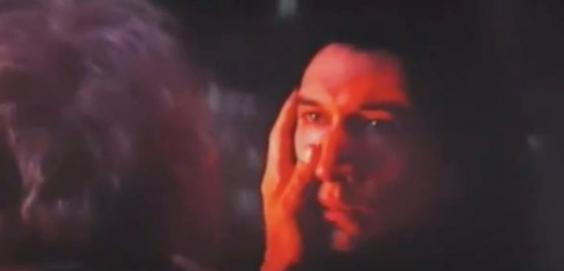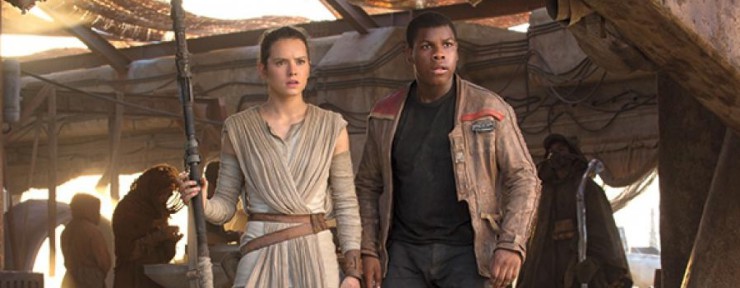Let’s pretend for a second that The Academy Awards is designed to accurately represent the best achievements in a given year in the field of cinema. We know that it doesn’t—and the #oscarssowhite problem more than proves that—but let’s just say that the Oscars should be providing a representation of movies that were both relevant to the culture and were “good”: achieving the balance between entertaining people and doing something somewhat new in the field of cinema. I think The Academy Awards should have honored this approach by nominating Star Wars: The Force Awakens for Best Picture.
(Note: Spoilers ahead for The Force Awakens.)
Regardless of their genre, film sequels are rarely nominated for awards, and it is rare for them to be considered in high regard, although there are several notable exceptions. The Lord of the Rings: Return of the King (technically a sequel) did win Best Picture, as did The Godfather Part 2. Plus, Toy Story 3 (written by Force Awakens co-scribe Michael Arndt) was nominated for Best Picture in 2013, and it’s obviously a sequel. Whether these films deserved the nomination based on their quality is arguable, but regardless, these nominations prove that there have been sequel movies that the Oscar voters have liked in the past.
Is the quality of The Force Awakens as a film the reason behind its absence in this year’s nominations? You might say that a Star Wars movie isn’t the kind of movie the Oscar voters would ever dream of nominating, because it’s a Star Wars movie. Worse, you might be among those who believe The Force Awakens sucks because it “just” borrows the structure from A New Hope and contains way too much fan service to be considered its own film. I’m not super-interested in those criticisms of The Force Awakens, mostly because they seem to ignore the central themes and events of its story. The Force Awakens is not only extremely poignant, it covers brand new ground for a Star Wars film by being a psychologically realistic family drama which just happens to be set in outer space. It differs from its predecessors because instead of relying on mythological Joseph Campbell structures, it subverts its own mythology by presenting this galaxy far, far away not as we wish it was, but as it really would be.
Imagine another film with the exact same character conflicts of The Force Awakens, but instead of a Star Wars movie, it’s just a naturalistic fictional film called something like “Awaken”: It’s a drama set in 2015 on our planet. It takes place in a trailer park. Harrison Ford plays a dad named Han who is estranged from his son, Ben, mostly because his son has become a religious terrorist; the kind of person who would blow up clinics. This estrangement also broke up Han’s marriage and now, depressed at how his family has splintered apart, he’s selling illegal merchandise in the trailer park to make ends meet. A family friend, Luke, the former pastor of their local church, also went missing after Ben started blowing up buildings and shooting people. At some point, one of Ben’s newest recruits to his terrorist cell defects and has a chance encounter with Han and a young mechanic in the trailer park named Rey. This person’s name is Finn. Finn and Rey are determined to prevent Ben from blowing up more buildings or killing more people, and through their basic good-heartedness, they show Han how he can heal his family. (And demonstrate how maybe turning back to a life of petty crime wasn’t such a great idea.) Tragically, in the end, Ben kills his father anyway, leaving Rey and Finn depressed.
This is pretty much what happens in The Force Awakens. Take out all the science fiction and fantasy and I think I’ve just described the plot of a super-depressing “serious” Oscar contender. And if you think for one second Adam Driver and Harrison Ford couldn’t do the movie I just described, you’re crazy. Adam Driver and Harrison Ford should have been nominated for Best Supporting Actor and Best Actor for their work in The Force Awakens, respectively. Driver alone does what the prequels tried to do with Anakin in only one glance while Ford brings pain and pathos to a Han Solo who was previously—let’s face it—a fairly thinly written character.
Let’s think about what John Boyega, a black actor snubbed by this year’s Oscar voters, does as Finn: he presents the personality of a confused but essentially kind male who was systematically brainwashed, and clumsily asserts his own catch-as-catch-can values in a way that is both realistic and touching. When Finn screams “REYYY!!!!” at Kylo Ren’s shuttle, that scream could have gone many different ways. It could have been a cringe-worthy moment. But it wasn’t. He sold it. Playing a “regular guy,” who is “basically good,” is hard to do. Boyega took a “concept” character and made it into a real person. I’d maybe agree he wouldn’t deserve to get nominated for Best LEADING Actor, but Best Supporting? For sure.
Which brings us to Daisy Ridley as Rey. Look, if Daisy Ridley had delivered a so-so performance as Rey, I really wouldn’t be writing this article, but come on. The nuances this actor portrays are what actors talk about when they nerd out about acting. From the little snicker Rey gives Han Solo after he tells her “Chewie kinda likes you,” to her fantastic reaction to Maz’s urging to take Luke’s lightsaber, to her perfect mind-game showdown with Kylo Ren, Ridley sells us on this character being a complete person. Rey is not a re-do of Luke Skywalker, she’s something else. Both cockier and kinder than Luke. A badass like Han, but with more of a moral center. Like Finn, I’d argue a good person and a hero are actually more difficult to portray for an actor. It requires more than just wielding a lightsaber and flying a spaceship. It requires convincing the audience to go with that person on the journey, to believe in the illusion, and to not resent the character for their good fortune.
Honoring a movie that speaks to the culture it inhabits is part of what movie awards ought to be about. The Force Awakens not only subverted its own series (and genre’s) stereotypes by casting Daisy Ridley and John Boyega, but those actors also delivered excellent performances. Further, The Force Awakens commented on the villainy of white male religious fanatics (Kylo Ren) while flipping the generational critique of all previous six Star Wars films on its head. In the classic trilogy, the problems encountered by Luke, Han and Leia are seemingly the fault of the generation before them, and sure enough, the prequels show that generation making the mistakes that Han, Luke, and Leia have to fix.
But The Force Awakens isn’t like that. Instead of having Rey and Finn blame the previous generation for their problems, they instead feel the need to preserve and revive the progress that the previous generation made. Kylo Ren and General Hux, who are young guys living on the benefits created by the previous generation, are villains because they want to eliminate those benefits. Kylo’s character alone demonstrates that the older generation here—represented by Han and Leia—tried their best and things still went wrong, which is a much darker and a more realistic portrayal of life as it is. And that is a story that Star Wars has never tried to tell before.
The zeitgeist experienced something new with The Force Awakens. Star Wars movies, and maybe movies in general, will not be the same after this film. It pushed the complexities of gender, race, and how we visualize heroes and villains. How does that not sound like last year’s Best Picture?
Ryan Britt is the author of Luke Skywalker Can’t Read and Other Geeky Truths, out now from Plume. His writing has appeared in Clarkesworld, Den of Geek!, VICE, The Daily Beast, The Barnes & Noble SciFi & Fantasy Blog, The New York Times and elsewhere. He is a longtime contributor to Tor.com.











